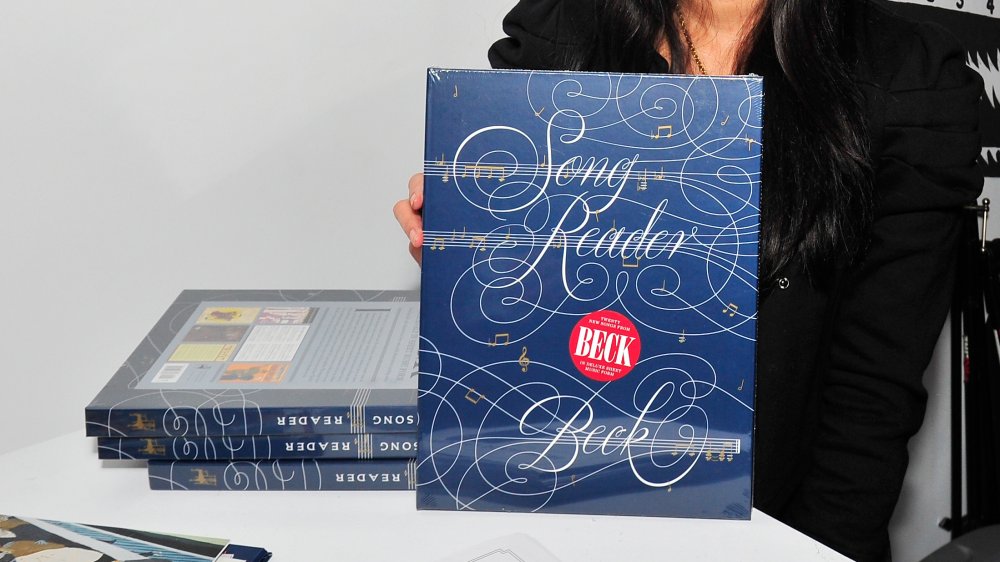The Untold Truth Of Beck
Beck has been responsible for some of the most inventive, genre-bending, boundary-pushing, and just all-out fun music of the last 25 years. Breaking out of the indie world in a huge way in the mid-'90s with the irony-soaked, hilarious slacker anthem "Loser," Beck has dropped more than a dozen albums of difficult-to-categorize music. Is it funk? Electro-pop? Folk? Country? Alternative rock? It's all of the above — let's none of us try to box in Beck, singer, songwriter, and multi-instrumentalist behind all-time jams like "Where It's At," "Sexx Laws," "The New Pollution," "Lost Cause," "E-Pro," and "Cellphone's Dead."
This champion of the DIY and independent music even earned one of the mainstream entertainment industry's most prestigious stamps of approval: the Grammy for Album of the Year for Morning Phase. There's just nothing Beck can't do, it would seem. A musician who creates such layered soundscapes has necessarily lived a wild and interesting existence. So grab your two turntables and your microphone and check out some of the most intriguing highlights from the life and career of Beck.
Beck comes from a very bohemian family
As a musician with a deep musical and cultural vocabulary, it should come as little surprise that Beck comes from an artsy family full of intriguing individualists. His paternal grandfather, a Presbyterian minister, introduced him to the world of church music. "That music influenced me a lot, but not consciously," he told Rolling Stone. "There's something biblical and awkward and great about those lyrics." He's noticed the direct influence of his late maternal grandfather, Al Hansen, on his work. "He collects cigarette butts and glues them together and makes pictures of naked ladies, then sprays the whole thing silver," Beck said. "His stuff was taking trash and making it art. I guess I try to do that, too."
Al Hansen's daughter, and Beck's mother is Bibbe Hansen, a performance artist and disciple of Andy Warhol. Beck's other parent is David Campbell, a bluegrass musician and arranger who worked on Beck's Sea Change. In addition to some musical tendencies, Beck also inherited his father's religion. "Yeah, I'm a Scientologist," he told the Sunday Tribune. "I grew up in and around it and stuff." That doesn't comprise his whole identity, however. He was "raised celebrating Jewish holidays" by his Jewish mother, Beck told Spin, "and I consider myself Jewish."
Actually, it's Beck Hansen, if you don't mind
Going by a single name carries with it a magical rock n' roll mystique: take for example Bono, Cher, and Beck. That's not the latter's full name, obviously, and nor is it even his real first name. The name on the birth certificate issued upon his entry into the world in 1970 read Bek Campbell. When he started school, a teacher changed his name to the more conventionally spelled Beck. When his parents, scenster Bibbe Hansen and musician David Campbell split up, Bek-turned-Beck adopted his mother's last name.
The whole "going by one name" wasn't a bit of rock n' roll legend-making, however. "It started when I was playing open-mike nights and small gigs. They would write out the bill and they'd only remember my first name and never bothered with my last name. Beck was easier to remember than Beck Hansen," he told Spin in 1997. After he found fame and fortune, he tried to bring his last name into his stage name by printing it on the cover of Odelay. "If you look at the back cover, in the lower-right-hand corner — they didn't want to put it on the front cover — it says in really tiny print, 'Hansen.' It's kind of too late to change, though."
Beck's song 'Loser' was a lark
Experimental musicians don't usually become major rock stars. But the world fell in love with Beck in 1994 because of "Loser," a song that sounded like nothing else on the time. It's a decidedly low-fi, DIY rap song, with a slide guitar riff, a self-deprecating bilingual chorus, dialogue samples, and bizarre lyrics like "dog food skulls and the beefcake pantyhose." Amazingly, "Loser" hit #10 on the pop chart, and Beck's long career was truly underway.
And to think, none of it would've been possible if Beck, an obscure Los Angeles indie/folkie hadn't spent an afternoon in the early '90s jamming with a stranger. Beck's friend Tom Rothrock was starting up an independent label called Bong Load Records. "Tom had called up and said, 'Hey I know this guy who does hip-hop beats and stuff. I said, 'Oh yeah, well sometimes I rap between songs and get people from the audience to do the beat-box thing into the mike,'" Beck told Option in 1994 (via SongFacts). Beck said the guy, Carl Stephenson, seemed "unimpressed" until he busted out the song's slide guitar riff. Rothrock's friend put a drum beat over it, and Beck brainstormed some lyrics. "When he played it back, I thought, 'Man, I'm the worst rapper in the world — I'm just a loser.'" Now they had a title for the song, which was entirely written and recorded in just six hours.
Beck's album Odelay wasn't supposed to work
Beck's first major release, Mellow Gold, was an odd album by mainstream music standards, which in an interview with Rolling Stone the artist likened to "a satanic K-Tel record that's been found in a trash dumpster" that some people "half-swallowed before spitting it out."
A dazzling pastiche of punk, noise, folk, and country, Odelay was arguably even odder, and was met with near universal acclaim upon its release in 1996. Rolling Stone said it "takes Beck's kitchen-sink approach to new extremes while also managing to remain a seamless whole; the songs flow together with intelligence and grace." At the 1997 Grammy Awards, it earned a nomination for Album of the Year and won for Best Alternative Performance. When all was said and done, Odelay sold more than two million copies and generated alt-rock radio classics like "Devils Haircut" and "Where It's At." And yet, for some reason, the behind-the-scenes, pre-release scuttlebutt on the album was that it was going to fail. In 2012, Beck told Vulture that "someone major in the business" told him that "putting out Odelay would be a huge mistake." Up until its success, Beck believed that notion, too, convinced for months that he'd "blown it forever."
Beck managed to speed-record an album
After finishing up a long tour in support of his 1996 album Odelay, Beck realized that, apart from a quick song for the soundtrack to A Life Less Ordinary, he hadn't laid down any tracks in a recording studio for a few years. "I was insanely anxious to do something creative with the band – go in and just do some stuff real quick," he told Rolling Stone. "So I scared up a bunch of songs I had sitting around." He recorded and then mixed that handful of songs in about a day, but didn't know what to do next because his producer, Nigel Godrich, was set to go on a vacation. "And then suddenly he called and said, 'I'll blow it off. I have 14 days. We'll just go in and do it.'"And so, in 14 days, Beck and Godrich recorded and mixed 14 songs, with no "doctoring anything" afterward. That album, as it was speedily recorded, became Beck's 1998 LP Mutations.
Beck sued two record labels over Mutations
While recording Mutations was a brief endeavor for Beck, the album's release proved to be a major hassle for all parties involved. At the time, Beck had a unique contractual arrangement: While signed to major label Geffen Records, he maintained a relationship with the indie Bong Load Records. That's the company which had released "Loser," and still held the vinyl rights to Beck's recordings, even the big albums he made for Geffen. Beck wanted to continue releasing more experimental work with Bong Load, and so that's where he sent the Mutations masters. But then the album came out on Geffen, without, Beck says, his permission, leading him to sue both of his labels in early 1999. The suit wasn't settled until later that year, just weeks before the scheduled release of Midnite Vultures. Under the terms of the settlement, Beck agreed to record solely for Geffen from that point, while Bong Load could keep its right to make Beck's vinyl records.
Beck has a song so smooth it breaks several 'Laws'
Beck makes wild music videos that can be just as postmodern (and baffling) as his songs. Arguably his most entertaining is the clip for "Sexx Laws," a boisterous slice of horn-driven funk off his 1999 album Midnite Vultures. This video, directed by Beck himself, has everything: a support group interrupted by football players crashing through walls, floating furniture, fornicating canned goods, a banjo player with a zebra head, sky pirates, cheesy robot costumes, a wizard, an inspirational monologue about violas from Jack Black, and a brief appearance by a man with long, curly black hair playing a saxophone who looks just like smooth jazz king Kenny G. It's not the real G-man, but Beck collaborator Justin Meldal-Johnsen in a Kenny G costume.
Beck was apparently so inspired by the mere notion of being in the same orbit as Kenny G that he re-recorded "Sexx Laws" as an ultra-smooth, G-worthy tune called "Saxx Laws" that runs more than six minutes. "The track came about when the idea arose to get some one to do a Smooth Jazz arrangement of the song instead of a remix," Beck said on his website (via L.A. Weekly). "The track beautifully evokes the abandon of smooth," he added. Beck even remade the "Sexx Laws" video, set to the dulcet tones of "Saxx Laws." (One thing: A session saxophonist plays on the song — apparently the real Kenny G was busy.)
Beck got super weird on the American Music Awards
The American Music Awards were created in 1973 by Dick Clark, entertainment impresario and host of American Bandstand, a "live" music show in which the biggest bands in the land appeared and lip-synced and mimed playing their instruments to their own pre-recorded hits. For years, pretending to play was the modus operandi for Clark's American Music Awards, too, much to the delight of Beck, slated to perform on the show's 2000 iteration. "When we got there they told us that we had to play to a recording," Beck told Pitchfork. "I thought, 'This is going to be really good because now I can just have the band do other things.'"
After less than a minute into "Mixed Bizness," most of the band dropped the charade of play-acting at playing. "Some people were doing calisthenics while others had gone in the audience and were just hanging out," Beck said. The drummer kept playing, although he beat on the drums with his hands instead of sticks. "It might have been a little bit obnoxious or bratty, but it was so liberating — just having Garth Brooks and Whitney Houston in the front row, not sure what was happening. It was one of those moments when the machine shudders for a second." People watching the broadcast didn't see much of Beck and crew's antics, however. "They just cut to my face so you couldn't see anything," Beck explained.
Sometimes even Beck gets sad
Throughout his entire output of music in the '90s, Beck leaned toward the danceable and the electro-funk, stuff he could groove to on stage, like "Sexx Laws." That all changed in 2002 when Beck made a major statement with Sea Change, a sad, stark, folk record about the end of a relationship. (Among the bleak song titles: "Lost Cause," "Already Dead," and "Lonesome Tears.")
Sea Change came in the wake of a sea change in Beck's personal life — he wrote those songs just after he split with his fiancee Leigh Limon after nine years together. According to the magazine Allstar (via The Guardian), the pair broke it off after Beck, finishing up a tour, discovered Limon had been seeing a member of the band Whiskey Biscuit on the side. While Beck wouldn't directly address his split with Limon while doing press for Sea Change, he did explain why he made the record. "They're honest and simple songs and they're trying to capture a universal experience that anybody goes through. It's taking something sad and trying to turn it into something that's hopeful at the end," Beck told MTV, adding that he "always wanted to make" a so-called "depressing" album like Joni Mitchell or Leonard Cohen did, because they help people going through sad times recover. "It just feels good."
Beck released an album that wasn't an album at all
After recording more than 10 albums by 2012, how else could Beck keep innovating modern music and also challenge himself? He prepared a new collection of songs and then released them to the world in their most elementary and bare bones form: as sheet music.
In the 19th century, before the arrival of mass-produced audio media, songs gained popularity as sheet music — essentially instructions on how to play a tune on an instrument, usually the piano. That's the gist of Beck's 2012 project Song Reader, an album not of recorded tracks but a blue binder packed with the the sheet music of 20 new songs. The singer-songwriter invited fans to play the songs themselves to see how they sounded. Groups like the all-cello Portland Cello Project obliged, although in 2014, a proper Song Reader LP arrived. However, Beck sings on just one song, handing off the work to stars like Jack Black, Norah Jones, and Jeff Tweedy of Wilco.
A spinal injury thoroughly derailed Beck's career
In 2005, Beck filmed a video for his single "E-Pro," in which he soars and dangles like a puppet over a series of CGI backgrounds. "There was this crazy choreography, where he was in a harness inside this moving wheel, being hit with sticks," the singer's drummer Joey Waronker told Rolling Stone. But somehow, he got "seriously hurt" during the 10-hour video shoot.
Not wanting to sound "like the guy who won't stop talking about his war wounds at the picnic," Beck hasn't said much about the specifics of what amounted to years of intense spinal pain, but it did limit his ability to dance on stage, and finally forced him off the road altogether. "I stopped touring indefinitely, and I didn't know if I ever would again. I wasn't able to use my guitar and voice in the same way. It altered my life for a long time," he said. In late 2013 — more than eight years after the "E-Pro" shoot — Beck told Argentine paper Pagina/12 (translation via The Future Heart) that he was finally on the mend, although he did "not think I can move again as before, although I can give a lot onstage."
Surprise! Beck got divorced
After the demise of his nine-year relationship-then-engagement to a woman that inspired his 2002 album Sea Change, Beck was fortunate enough to fall in love again. In 2004, he married actress Marissa Ribisi, probably best known for playing Cynthia, the quiet, smart redhead that Matthew McConaughey's character hits on in the 1993 teen classic Dazed and Confused. Before long, they started a family — the couple had two kids together, son Cosimo and daughter Tuesday.
The marriage suddenly and quietly fell apart in June 2017. That's the date of separation mentioned in the legal paperwork Beck submitted when he filed for divorce in February 2019. That was news to Ribisi, as was her husband's move to divorce her — in her paperwork, she listed the date of separation as February 15, 2019 ... the day Beck asked a court to set him free. The divorce proceedings are still ongoing as of this writing and could be contentious — Beck requested joint custody of their children, while Ribisi asked that she be granted primary custody.












